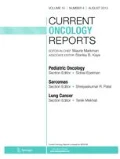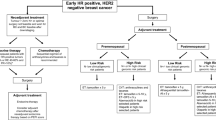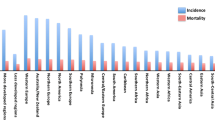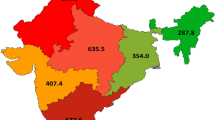Abstract
Aging poses an unique opportunity to study cancer biology and treatment in older adults. Breast cancer is often studied in young women; however, much investigation remains to be done on breast cancer in our expanding elderly population. Diagnostic and management strategies applicable to younger patients cannot be empirically used to manage older breast cancer patients. Lack of evidence-based data continues to be the major impediment toward delivery of personalized cancer care to elderly breast cancer patients. This article reviews the relevant literature on management of curable breast cancer in the elderly, the role of geriatric assessment, complex treatment decision making within the context of patient’s expected life expectancy, comorbidities, physical function, socioeconomic status, barriers to health care delivery, goals of treatment, and therapy-related side effects. Continuing efforts for enrolling elderly breast cancer patients in contemporary clinical trials, and thus improving age-appropriate care, are emphasized.
Similar content being viewed by others
References
Papers of particular interest, published recently, have been highlighted as: • Of importance •• Of major importance
Tesarova P. Breast cancer in the elderly—Should it be treated differently? Rep Pract Oncol Radiother. 2013;18(1):26–33.
American Cancer Society. Breast Cancer Facts & Figures 2013–2014. Atlanta: American Cancer Society, Inc. Available at: http://www.cancer.org/.
Ferlay J, Soerjomataram I, Dikshit R, et al. Cancer incidence and mortality worldwide: sources, methods and major patterns in GLOBOCAN. Int J Cancer. 2012;136:E359–86.
Howlader N, Noone AM, Krapcho M, et al. SEER Cancer Statistics Review, 1975–2012, National Cancer Institute. Available at: http://seer.cancer.gov/csr/1975-2012
Bray F, McCarron P, Parkin DM. The changing global patterns of female breast cancer incidence and mortality. Breast Cancer Res. 2004;6:229–39.
Wildiers H, Van Calster B, van de Poll-Franse L, et al. Relationship between age and axillary lymph node involvement in women with breast cancer. J Clin Oncol. 2009;27:2931–7.
Anderson W, Katki H, Rosenberg P. Incidence of breast cancer in the United States: current and future trends. J Natl Cancer Inst. 2011;103:1397–402.
Markopoulos C, Van-de-Water W. Older patients with breast cancer: Is there bias in the treatment they receive? Ther Adv Med Oncol. 2012;4(6):321–7.
Smith B, Jiang J, McLaughlin S, et al. Improvement in breast cancer outcomes over time: Are older women missing Out? J Clin Oncol. 2011;29:4647–53.
Bastiaannet E, Liefers G, de Craen A, et al. Breast cancer in elderly compared to younger patients in The Netherlands: stage at diagnosis, treatment and survival in 127,805 unselected patients. Breast Cancer Res Treat. 2010;124:801–7.
Rosso S, Gondos A, Zanetti R, et al. Up-to-date estimates of breast cancer survival for the years 2000–2004 in 11 European countries: the role of screening and a comparison with data from the United States. Eur J Cancer. 2010;46:3351–57.
Schonberg M, Marcantonio E, Li D, et al. Breast cancer among the oldest old: tumor characteristics, treatment choices, and survival. J Clin Oncol. 2010;28:2038–45.
Bouchardy C, Rapiti E, Fioretta G, et al. Under treatment strongly decreases prognosis of breast cancer in elderly women. J Clin Oncol. 2003;21:3580–7.
Yancik R, Wesley MN, Ries LA, et al. Effect of age and comorbidity in postmenopausal breast cancer patients aged 55 years and older. JAMA. 2001;285(7):885–92.
Allemani C, Storm H, Voogd A, et al. Variation in ‘standard care’ for breast cancer across Europe: a EUROCARE-3 high resolution study. Eur J Cancer. 2010;46:1528–36.
Lavelle K, Moran A, Howell A, et al. Older women with operable breast cancer are less likely to have surgery. Br J Surg. 2007;94:1209–15.
Morgan J, Richards P, Francis M, et al. Case mix analysis and variation in rates of non-surgical treatment of older women with operable breast cancer. Br J Surg. 2015;102(9):1056–63.
Kiderlen M, Ponti A, Mariano T, et al. Variations in compliance to quality indicators by age for 41,871 breast cancer patients across Europe: a European society of breast cancer specialists database analysis. Eur J Cancer. 2015;51:1221–30.
Hughes K, Schnaper L, Bellon J, et al. Lumpectomy plus tamoxifen with or without irradiation in women age 70 years or older with early breast cancer: long-term follow-up of CALGB 9343. J Clin Oncol. 2013;31:2382–7.
Danese M, O’Malley C, Lindquist K, et al. An observational study of the prevalence and incidence of comorbid conditions in older women with breast cancer. Ann Oncol. 2012;23(7):1756–65.
Satariano WA, Ragland DR. The effect of comorbidity on 3-year survival of women with primary breast cancer. Ann Intern Med. 1994;120:104–10.
Saux OL et al. Optimal management of breast cancer in the elderly patient: current perspectives. Clin Interv Aging. 2015;10:157–74. An excellent and comprehensive review of multiple issues in the management of breast cancer in older patients
Pallis A, Fortpied C, Wedding U, et al. EORTC elderly task force position paper: approach to the older cancer patient. Eur J Cancer. 2010;46:1502–13.
Hurria A, Wildes T, Baumgartner J, et al. NCCN Guidelines Version 1.2016 Older Adult Oncology. Available at: http://www.nccn.org/professionals/physician_gls/pdf/senior.pdf. Comprehensive guidelines for the management of elderly cancer patients, including supportive care issues.
Decoster L, Van Puyvelde K, Mohile S, et al. Screening tools for multidimensional health problems warranting a geriatric assessment in older cancer patients: an update on SIOG recommendations. Ann Oncol. 2015;26(2):288–300.
Overcash J, Beckstead J, Moody L, et al. The abbreviated comprehensive geriatric assessment (aCGA) for use in the older cancer patient as a prescreen: scoring and interpretation. Crit Rev Oncol Hematol. 2006;59:205–10.
Fried L, Tangen C, Walston J, et al. Frailty in older adults: evidence for a phenotype. J Gerontol A Biol Sci Med Sci. 2001;56:146–56.
Bellera C, Rainfray M, Mathoulin-Pélissier S, et al. Screening older cancer patients: first evaluation of the G-8 geriatric screening tool. Ann Oncol. 2012;23:2166–72.
Saliba D, Elliott M, Rubenstein LZ, et al. The Vulnerable Elders Survey: a tool for identifying vulnerable older people in the community. J Am Geriatr Soc. 2001;49:1691–9.
Luciani A, Ascione G, Bertuzzi C, et al. Detecting disabilities in older patients with cancer: comparison between comprehensive geriatric assessment and vulnerable elders survey-13. J Clin Oncol. 2010;28:2046–50.
Hurria A, Gupta S, Zauderer M, et al. Developing a cancer-specific geriatric assessment: a feasibility study. Cancer. 2005;104:1998–2005.
Hurria A, Cirrincione C, Muss H, et al. Implementing a Geriatric Assessment in Cooperative Group Clinical Cancer Trials: CALGB 360401. J Clin Oncol. 2011;29:1290–6. Describes the use of a comprehensive geriatric assessment tool in clinical trials.
Hurria A, Togawa K, Mohile S, et al. Predicting Chemotherapy Toxicity in Older Adults With Cancer: A Prospective Multicenter Study. J Clin Oncol. 2011;29:3457–65.
Lee J, Lindquist K, Segal MR, et al. Development and validation of a prognostic index for 4-year mortality in older adults. JAMA. 2006;295(7):801–8.
Schonberg M, Davis R, McCarthy E, et al. Index to predict 5-year mortality of community-dwelling adults aged 65 and older using data from the National Health Interview Survey. J Gen Intern Med. 2009;24(10):1115–22.
Cruz M, Covinsky K, Widera E, et al. Predicting 10-year mortality for older adults. JAMA. 2013;309(9):874–6.
Schonberg M, Davis R, McCarthy E, et al. External validation of an index to predict up to 9-year mortality of community-dwelling adults aged 65 and older. J Am Geriatr Soc. 2011;59(8):1444–51.
Hind D,Wyld L, Reed MW. Surgery, with or without tamoxifen, vs tamoxifen alone for older women with operable breast cancer: Cochrane review. Br J Cancer. 2007;96(7):1025–9.
Fentiman IS, Christiaens MR, Paridaens R, et al. Treatment of operable breast cancer in the elderly: a randomized clinical trial EORTC 10851 comparing tamoxifen alone with modified radical mastectomy. Eur J Cancer. 2003;39(3):309–16.
Bates T, Riley DL, Houghton J, et al. Breast cancer in elderly women: a Cancer Research Campaign trial comparing treatment with tamoxifen and optimal surgery with tamoxifen alone. The Elderly Breast Cancer Working Party. Br J Surg. 1991;78:591–4.
Mustache G, Ceccherini R, Milani S, et al. Italian Cooperative Group GRETA Tamoxifen alone versus adjuvant tamoxifen for operable breast cancer of the elderly: long-term results of the phase III randomized controlled multicenter GRETA trial. Ann Oncol. 2003;14:414–20.
Fentiman IS, van Zijl J, Karydas I, et al. Treatment of operable breast cancer in the elderly: a randomized clinical trial EORTC 10850 comparing modified radical mastectomy with tumorectomy plus tamoxifen. Eur J Cancer. 2003;39(3):300–8.
Giuliano AE, Hunt KK, Ballman KV, et al. Axillary dissection vs no axillary dissection in women with invasive breast cancer and sentinel node metastasis: a randomized clinical trial. JAMA. 2011;305(6):569–75. Describes the results of important American College of Surgeons Oncology Group (ACOSOG) Z0011 study.
Ramesh H, Boase T, Audisio R. Risk assessment for cancer surgery in elderly patients. Clin Interv Aging. 2006;1(3):221–7.
Smith IE, Dowsett M, Ebbs SR, et al. Neoadjuvant treatment of postmenopausal breast cancer with anastrozole, tamoxifen, or both in combination: the Immediate Preoperative Anastrozole, Tamoxifen, or Combined with Tamoxifen (IMPACT) multicenter double-blind randomized trial. J Clin Oncol. 2005;23:5108–16.32.
Eiermann W, Paepke S, Appfelstaedt J, et al. Preoperative treatment of postmenopausal breast cancer patients with letrozole: a randomized double-blind multicenter study. Ann Oncol. 2001;12:1527–32.33.
Preece PE, Wood RA, Mackie CR, et al. Tamoxifen as initial sole treatment for localised breast cancer in elderly women: a pilot study. Br Med J. 1982;284:869–70.
Masuda N, Sagara Y, Kinoshita T, et al. Neoadjuvant anastrozole versus tamoxifen in patients receiving goserelin for premenopausal breast cancer (STAGE): a double-blind, randomized phase 3 trial. Lancet Oncol. 2012;13:345–52.34.
Llombart-Cussac A, Guerrero A, Galan A, et al. Phase II trial with letrozole to maximum response as primary systemic therapy in postmenopausal patients with ER/PgR [+] operable breast cancer. Clin Transl Oncol. 2012;14:125–31.36.
Hille U, Soergel P, Länger F, et al. Aromatase inhibitors as solely treatment in postmenopausal breast cancer patients. Breast J. 2012;18:145–50.37.
Dixon JM, Renshaw L, MacAskill EJ, et al. Increase in response rate by prolonged treatment with neoadjuvant letrozole. Breast Cancer Res Treat. 2009;113:145–51.
Colleoni M, Montagna E. Neoadjuvant therapy for ER-positive breast cancers. Ann Oncol. 2012;23:243–48. Review of literature of pre-operative endocrine therapy in hormone receptor positive breast cancer.
Cataliotti L, Buzdar AU, Noguchi S, et al. Comparison of anastrozole versus tamoxifen as preoperative therapy in postmenopausal women with hormone receptor-positive breast cancer: the Pre-Operative “Arimidex” Compared to Tamoxifen (PROACT) trial. Cancer. 2006;106:2095–103.31.
Ellis MJ, Suman VJ, Hoog J, et al. Randomized phase II neoadjuvant comparison between letrozole, anastrozole, and exemestane for postmenopausal women with estrogen receptor-rich stage 2 to 3 breast cancer: clinical and biomarker outcomes and predictive value of the baseline PAM50-based intrinsic subtype--ACOSOG Z1031. J Clin Oncol. 2011;29:2342–9.35.
Berruti A, Generali D, Kaufmann M, et al. International expert consensus on primary systemic therapy in management of early breast cancer: highlights of the Fourth Symposium on Primary Systemic Therapy in the Management of Operable Breast Cancer. J Natl Cancer Inst Monogr. 2011;43:147–51.
Crivellari D, Sun Z, Coates AS, et al. Letrozole compared with tamoxifen for elderly patients with endocrine-responsive early breast cancer: the BIG 1–98 trial. J Clin Oncol. 2008;26:1972–9.
Muss HB, Tu D, Ingle JN, et al. Efficacy, toxicity, and quality of life in older women with early-stage breast cancer treated with letrozole or placebo after 5 years of tamoxifen: NCIC CTG intergroup trial MA.17. J Clin Oncol. 2008;26:1956–64.
Puts MT, Tu HA, Tourangeau A, et al. Factors influencing adherence to cancer treatment in older adults with cancer: a systematic review. Ann Oncol. 2014;25:564–77.
Kardas P, Lewek P, Matyjaszczyk M. Determinants of patient adherence: a review of systematic reviews. Front Pharmacol. 2013;4:91.
Verbrugghe M, Verhaeghe S, Lauwaert K, et al. Determinants and associated factors influencing medication adherence and persistence to oral anticancer drugs: a systematic review. Cancer Treat Rev. 2013;39:610–21.
Muss HB et al. Adjuvant chemotherapy in older women with early-stage breast cancer. N Engl J Med. 2009;360(20):2055–65. Seminal CALGB 49907 randomized controlled trial comparing Capecitabine alone to standard chemotherapy in elderly breast cancer patients.
Jones S, Holmes FA, O’Shaughnessy J, et al. Docetaxel with cyclophosphamide is associated with an overall survival benefit compared with doxorubicin and cyclophosphamide: 7-year follow up of U.S. Oncology Research Trial 9735. J. Clin Oncol. 2009;27:1177–83.
Vaz-Luis I, Keating N, Lin N, et al. Duration and Toxicity of Adjuvant Trastuzumab in Older Patients with Early-Stage Breast Cancer: A Population-Based Study. J Clin Oncol. 2014;32:927–34.
Tolaney SM, Barry WT, Dang CT, et al. Adjuvant paclitaxel and trastuzumab for node-negative, HER2-positive breast cancer. N Engl J Med. 2015;372:134–41. A phase II single arm study describing the use of a de-escalated trastuzumab based regimen in the elderly breast cancer patients.
Barcenas CH et al. Risk of Hospitalization According to Chemotherapy Regimen in Early-Stage Breast Cancer. JCO 2014 Vol. 32 No. 19.
Hughes K, Schnaper L, Berry D, et al. Lumpectomy plus Tamoxifen with or without Irradiation in Women 70 Years of Age or Older with Early Breast Cancer. N Engl J Med. 2004;351:971–7.
Kunkler I, Williams L, Jack W, et al. Breast-conserving surgery with or without irradiation in women aged 65 years or older with early breast cancer (PRIME II): a randomized controlled trial. Lancet Oncol. 2015;16:266–73.
Gradishar WJ, Anderson BO, Balassanian R, et al. NCCN guidelines Version 1.2016 Breast Cancer. Available at: http://www.nccn.org/professionals/physician_gls/pdf/breast.pdf
Bentzen SM, Agrawal RK, Aird EG, et al. The UK Standardization of Breast Radiotherapy (START) Trial B of radiotherapy hypofractionation for treatment of early breast cancer: a randomized trial. Lancet. 2008;371:1098–107.
Haviland JS, Agrawal R, Aird E, et al. The UK START (Standardization of Breast Radiotherapy) Trials: 10-year follow-up results. Cancer Res. 2012;72:S3.
Whelan T, MacKenzie R, Julian J, et al. Randomized trial of breast irradiation schedules after lumpectomy for women with lymph node-negative breast cancer. J Natl Cancer Inst. 2002;94:1143–50.
Whelan TJ, Pignol JP, Levine MN, et al. Long-term results of hypofractionated radiation therapy for breast cancer. N Engl J Med. 2010;362:513–20.
Dragun AE et al. A phase 2 trial of once-weekly hypofractionated breast irradiation: first report of acute toxicity, feasibility, and patient satisfaction. Int J Radiat Oncol Biol Phys. 2013;85(3):e123–8.
Nightingale G, Hajjar E, Swartz K, et al. Evaluation of a pharmacist-led medication assessment used to identify prevalence of and associations with polypharmacy and potentially inappropriate medication use among ambulatory senior adults with cancer. J Clin Oncol. 2015;33:1453–9.
American Geriatrics Society 2012 Beers Criteria- Update Expert Panel. American Geriatrics Society updated Beers Criteria for potentially inappropriate medication use in older adults. J Am Geriatr Soc. 2012;60:616–31.
Gallagher P, O’Mahony D. STOPP (Screening Tool of Older Persons’ potentially inappropriate Prescriptions): Application to acutely ill elderly patients and comparison with Beers’ criteria. Age Ageing. 2008;37:673–9.
Mahony D, O’Sullivan D, Byrne S, et al. STOPP/START criteria for potentially inappropriate prescribing in older people: version 2. Age Ageing. 2015;44(2):213–8.
Extermann M, Boler I, Reich R, et al. Predicting the Risk of Chemotherapy Toxicity in Older Patients: The Chemotherapy Risk Assessment Scale for High-Age Patients (CRASH) Score. Cancer. 2012;118:3377–86.
Hurria A, Mohile S, Gajra A, et al. Validation of a Prediction Tool for Chemotherapy Toxicity in Older Adults With Cancer. J Clin Oncol. 2016. doi:10.1200/JCO.2015.65.4327.
VanderWalde A, Hurria A. Aging and Osteoporosis in Breast and Prostate Cancer. CA Cancer J Clin. 2011;61:139–56.
Hillner B, Ingle J, Chlebowski R, et al. American Society of Clinical Oncology 2003 update on the role of bisphosphonates and bone health issues in women with breast cancer. J Clin Oncol. 2003;21(21):4042–57.
Gralow JR, Biermann J, Farooki A, et al. NCCN Task Force Report: Bone Health in Cancer Care. J Natl Compr Canc Netw. 2009;7 suppl 3:S1–S32. quiz S33-S35.
Reid DM, Doughty J, Eastell R, et al. Guidance for the management of breast cancer treatment-induced bone loss: a consensus position statement from a UK Expert Group. Cancer Treat Rev. 2008;34 suppl 1:S3–S18.
Gosain R, Miller K. Symptoms and symptom management in long-term cancer survivors. Cancer J. 2013;19(5):405–9.
Nelson CJ, Nandy N, Roth AJ. Chemotherapy and cognitive deficits: mechanisms, findings, and potential interventions. Palliat Support Care. 2007;5:273–80.
Rao A, Cohen HJ. Symptom management in the elderly cancer patient: fatigue, pain, and depression. J Natl Cancer Inst Monogr 2004:150–157.
Naeim A, Aapro M, Subbarao R, et al. Supportive Care Considerations for Older Adults With Cancer. J Clin Oncol. 2014;20:2627–34.
Gerber L, Stout N, Charles M, et al. Factors predicting clinically significant fatigue in women following treatment for primary breast cnacer. Support Care Cancer. 2011;19(10):1581–91.
Fu MR, Rosedale M. Breast Cancer Survivors’ Experiences of Lymphedema-Related Symptoms. J Pain Symptom Manag. 2009;38(6):849–59.
Balci LF et al. Breast Cancer-Related Lymphedema in Elderly Patients. Geriatric Rehabil. 2012;28(4):243–53.
Diell-Conwright CM, Orozco BZ. Exercise after breast cancer treatment: current perspectives. Breast Cancer: Targets Ther. 2015;7:353–62.
Author information
Authors and Affiliations
Corresponding author
Ethics declarations
Conflict of Interest
Rahul Gosain, YaoYao Pollock, and Dharamvir Jain declare that they have no conflict of interest.
Human and Animal Rights and Informed Consent
This article does not contain any studies with human or animal subjects performed by any of the authors.
Additional information
This article is part of the Topical Collection on Geriatric Oncology
Rights and permissions
About this article
Cite this article
Gosain, R., Pollock, Y. & Jain, D. Age-related Disparity: Breast Cancer in the Elderly. Curr Oncol Rep 18, 69 (2016). https://doi.org/10.1007/s11912-016-0551-8
Published:
DOI: https://doi.org/10.1007/s11912-016-0551-8




